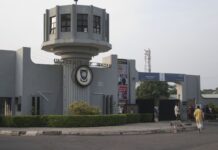Vice president, Prof. Yemi Osinbajo, has said that the crucial component of the present administration’s economic policy from the outset has been its partnership with the private sector and a rigorous process of engagement with them.
Osinbajo who stated this in his opening remarks at the 8th edition the Presidential Business Forum held in Abuja on Monday said the engagement of the private sector in economic development “is neither merely ideological nor rhetorical” adding that “it is simply the only way to go.”
“Our 2018 budget is N9 trillion, and if you add the budgets of all 36 States, you may add probably another N12-15 trillion. This is barely 10 per cent of gross domestic product (GDP). Meanwhile private sector investment in the economy is in the order of 60-70 per cent of GDP. How do you plan when most of your economy is not factored in?
“This is why in practically every detail of the implementation of our Economic Recovery and Growth Plan (ERGP); we have ensured a rigorous process of engagement with the private sector.”
He added that the development of the federal government’s policies around exports and other aspects of trade had also taken the same route of constant engagement with the private sector.
“We have dedicated groups looking at a variety of issues important to our export strategies. Our trade policy motives are to use the appropriate tools and instruments to strengthen the export potential within the economy and exporters who add value to goods; and apply incentives that promote and support investments and exporters who add value to goods.”
On Nigeria’s negotiations regarding the African Continental Free Trade Agreement (AfCTA) Osinbajo said: “There are clearly huge gains for us. The rest of Africa also naturally sees the enormous advantage of Nigeria’s participation. But we must be sure that we get the best possible terms for Nigerian trade and commerce.”
He however urged stakeholders “to be careful not to give the impression that there are minimum preconditions for continuous engagement with the process of signing the AfCTA”.
“Our focus is to create a strong economy that is friendly to investment and that is conducive for growth and resilient to shocks.
“To grow additional investments, we are also developing a systematic and data-driven approach towards engaging with international trade partners that will ensure that we are focused in our approach to entering bilateral trade engagements and we realise maximum returns from this,” he said.
On the government’s efforts to improve infrastructure in the country, the vice president said “the difference in substance in this administration, is the President’s commitment to getting infrastructure done.”
“Not only are we investing more than ever before on infrastructure, we are also ensuring that we complete projects like the Kaduna-Abuja railway, Abuja light rail, started in 2007, stalled in 2010, meant to have been completed in time for the 2014 Commonwealth Games, it was abandoned, we just completed it in 2018. The Mambilla Hydro Project is 40 years old in planning, but we have now budgeted for it and we are raising the capital,” he added.
Earlier, the honorary life vice-president of the Nigerian Association of Chambers of Commerce, Industry, Mines and Agriculture (NACCIMA), Mrs. Nike Akande, the Vice President of the Manufacturers Association of Nigeria (MAN) in the Northwest zone, Mr. Ibrahim Usman had said that the economic initiatives of the federal government had recorded steady improvements, particularly in power, infrastructure and ease of doing business reforms.
“First I have to recognize the efforts of the government. The ease of doing business is working and I can attest to that myself,” said Akande.
She also expressed optimism that “things will continue to improve as a lot had already improved in the country especially in the area of power.”
In the area of port operation, Akande said there was need to improve access to Tin can and Apapa ports to complement government’s ease of doing business initiative.
For his part, Ibrahim commended the federal government’s initiative to address the power generation and supply challenges in the country which he said “has helped the growth of commerce and trade in Nigeria.”
“We know this government is doing very well on infrastructure especially in power, roads and railway sectors. There is much to be done to make our goods and services to be more competitive and that is the only way we can benefit from the African Continental Free Trade Area,” he added.




















































